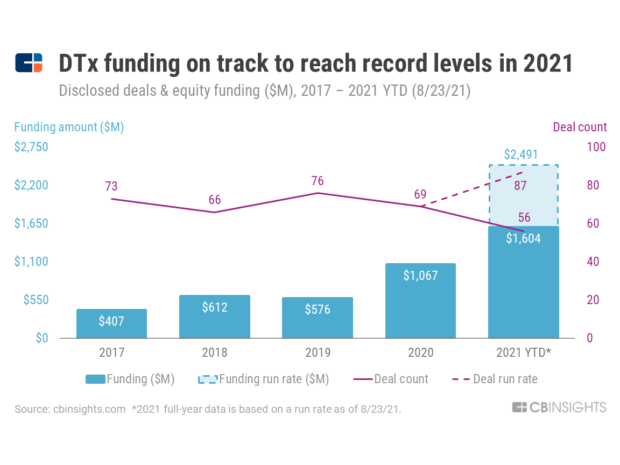Medicine today looks drastically different than it did fifty, even ten years ago. Digital health, biotechnology, continuous sensors, the list goes on. One arena that’s been particularly revolutionized is the management of complex and chronic diseases with the aid of software enabled, disease-specific platforms.
Conditions like heart disease, COPD, and diabetes have long been difficult to treat because of how interwoven their roots are with the human condition. We all know that we should choose that salad over the slice of pizza, opt for the morning run instead of the double shot of espresso, and gosh-darn-it say goodbye to those pesky cigarettes. But usually, despite our best intentions, we don’t. Physicians have been at a stalemate with chronic disease due to the trickiness of behavior change. Until now.
Enter digital therapeutics (DTx), a generation of medical technologies that promise to do more. Having trouble remembering to take your insulin? No problem, there’s a notification for that. Need motivation and guidance to act on that diet plan? Sure thing, let’s connect you with a health coach. Want to track your health outcomes beyond those infrequent doctor visits? Of course, here’s a continuous monitor and dashboard to go along with it.
Of the staggering $29.1B invested in digital health in 2021, digital therapeutics were responsible for over half of all funding. These tech-enabled clinical services are revolutionizing treatment of not only diabetes, but also a suite of other indications including pulmonary diseases, women’s health, chronic musculoskeletal pain, substance use disorder, and behavioral health conditions (depression, anxiety, PTSD). Mental health services alone raised $5.1B last year.

The nuances of these solutions vary by indication. Propeller leverages a sensor to track inhaler use in COPD and asthma patients. Pear Therapeutics integrates elements of cognitive behavioral therapy. Signos (Tau portfolio) leverages continuous glucose monitoring to guide weight loss.
Enticing value propositions and early clinical results have compounded copious venture funding. This sector is in a frenzy. Incumbents are leveraging acquisitions to hop verticals: in 2020 alone, Omada (initially a diabetes management platform) bought Physera (virtual physical therapy) for $30M while Teladoc (telemedicine) acquired Livongo (diabetes management) for a jaw dropping $18.5B. DTx startups are proliferating at an incredible rate, and competition is fierce for the favor of providers, payors, and employers.
At Tau Ventures we are encouraged by these trends but at the same time left with various questions. What is the differentiation? Is such competition bringing out the best, or is it hampering anyone from gaining the momentum and scale necessary to broaden access?
How can we be deliberate in leveraging virtual health technologies such that we don’t exacerbate cell phone addiction, digital fatigue, or the dehumanization of medicine? The early data is promising, but how rigorous is the evidence that these solutions truly work long-term?
These questions echo much of the hesitation and reticence health providers feel when confronted by digital therapeutics. The increased funding is a much needed trend but to truly make a dent in chronic diseases – conditions such as diabetes and heart disease that are responsible for killing 1.7 million, or 7 out of 10, Americans annually – we believe DTx needs to go further. Most solutions leverage a similar toolkit (coaching, analytics, gamification, notifications) to improve medication adherence and health maintenance. The next step is to blend these elements seamlessly into patient’s lives and providers’ workflows. AI and natural language processing have a huge role to play in understanding intent and communicating with users intelligently through voice (see Decoded Health, Tau Portfolio).
We believe that within the next ten years digital therapeutics will evolve into personal digital assistants that understand us as intimately as our family and friends. It will be a brave new world, where the ultimate user interface will be no user interface.
Co-authored this article with Kush Gupta. Originally published on “Data Driven Investor,” am happy to syndicate on other platforms. I am the Managing Partner and Cofounder of Tau Ventures with 20 years in Silicon Valley across corporates, own startup, and VC funds. These are purposely short articles focused on practical insights (I call it gl;dr — good length; did read). Many of my writings are at https://www.linkedin.com/in/amgarg/detail/recent-activity/posts and I would be stoked if they get people interested enough in a topic to explore in further depth. If this article had useful insights for you comment away and/or give a like on the article and on the Tau Ventures’ LinkedIn page, with due thanks for supporting our work. All opinions expressed here are my own.

